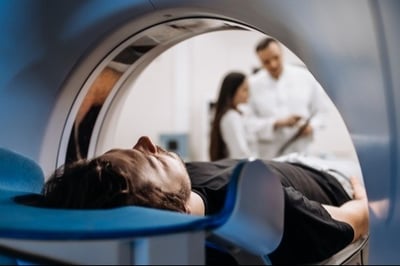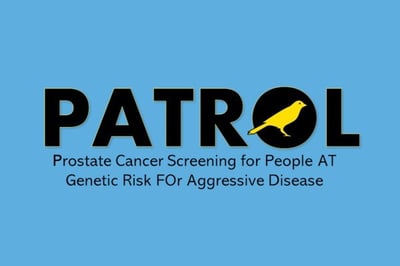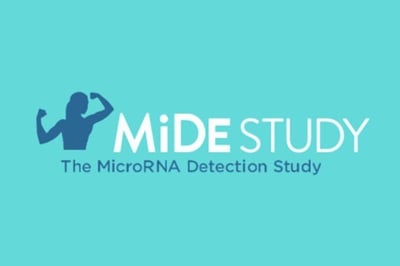Search Results: Prevention, Detection & Risk (6 results)
New Search
Prevention
Pancreatic cancer screening study for people with ATM, BRCA1, BRCA2 or PALB2 mutations
Pancreatic Cancer Screening Study for People with ATM, BRCA1, BRCA2 or PALB2 Mutations
This study will look at how often routine MRI scans detect abnormal findings in people with inherited mutations in BRCA1, BRCA2, ATM, and PALB2, who are undergoing pancreatic cancer screening. Researchers want to learn how often MRI and endoscopic ultrasound (EUS) yield abnormal results, and how frequently they find pancreatic cancer or precancer. The study will also review the rate of procedures like biopsies and surgeries among participants.

Prevention
Screening study for people with a mutation linked to prostate cancer risk
PATROL Study: Prostate Cancer Screening for People AT Genetic Risk FOr Aggressive Disease
The PATROL (Prostate Cancer Screening for People AT Genetic Risk FOr Aggressive Disease) study is for people at risk for prostate cancer because they carry one or more genes that are known or suspected to increase prostate cancer risk: BRCA2, HOXB13, ATM, BRCA1, MLH1, MSH2, MSH6, PALB2, PMS2, CHEK2, RAD51D, or TP53.

Prevention
Prostate screening with MRI for men with Lynch syndrome (MLH1, MSH2, MSH6, PMS2, EPCAM) or a BRCA1, BRCA2, HOXB13, ATM, NBN, TP53, BRIP1, CHEK2, PALB2, RAD51C, RAD51D, or other mutation
Screening Study for Men at High Genetic Risk for Prostate Cancer
The National Institutes of Health has a clinical trial for men at high genetic risk for prostate cancer. This is trial is for men without prostate cancer, ages 30 to 75, who have tested positive for Lynch syndrome (MLH1, MSH2, MSH6, PMS2, EPCAM) or BRCA1, BRCA2, HOXB13, ATM, NBN, TP53, BRIP1, CHEK2, PALB2, RAD51C, RAD51D, or FANC (FANCA, FANCB, FANCC, FANCD2, FANCE, FANCF, FANCG, FANCI, FANCL, and FANCM). The trial involves screening MRI of the prostate every two years and biopsy of the prostate if the MRI is abnormal. There is no cost for travel or study-related tests.

Prevention
Screening using MRI for men at risk of developing prostate cancer
MRI Screening in Men at High Risk of Developing Prostate Cancer
This study will determine if prostate magnetic resonance imaging (MRI) will find prostate cancer in men at high risk of developing prostate cancer.

Prevention
Screening study for women with a BRCA1, BRCA2, BRIP1, PALB2, RAD51C, RAD51D, PMS2, MLH1, MSH2, MSH6, or EPCAM mutation
Validating a Blood Test for Early Ovarian Cancer Detection in High-risk Women and Families: MicroRNA Detection Study (MiDE)
The goal of MiDe is to develop a clinical diagnostic test to detect early onset ovarian cancer, as currently, there are no good screening or early detection tests available. Participants can be expected to provide up to 4 tubes of blood every 6 months for up to 5 years. We can collect these samples through mobile phlebotomy all around the US. The study is enrolling people with an inherited mutation with a gene linked to ovarian cancer, such as BRCA1, BRCA2, BRIP1, PALB2, RAD51C, RAD51D, PMS2, MLH1, MSH2, MSH6, or EPCAM. Participants can be expected to provide up to 4 tubes of blood every 6 months for up to 5 years. We can collect these samples through mobile phlebotomy all around the US.

Prevention
Screening study to detect pancreatic cancer and precancer
A Pancreatic Cancer Screening Study for High Risk Individuals
The purpose of this study is to screen and detect pancreatic cancer and precancer in people with either a strong family history of pancreatic cancer, or an inherited mutation associated with pancreatic cancer risk.
Magnetic Resonance Imaging (MRI) will be used to screen for early stage pancreatic cancer. Participants will also be asked to donate a blood sample at specific intervals for the creation of a blood bank necessary for the development of a blood-based screening test for pancreatic cancer.
